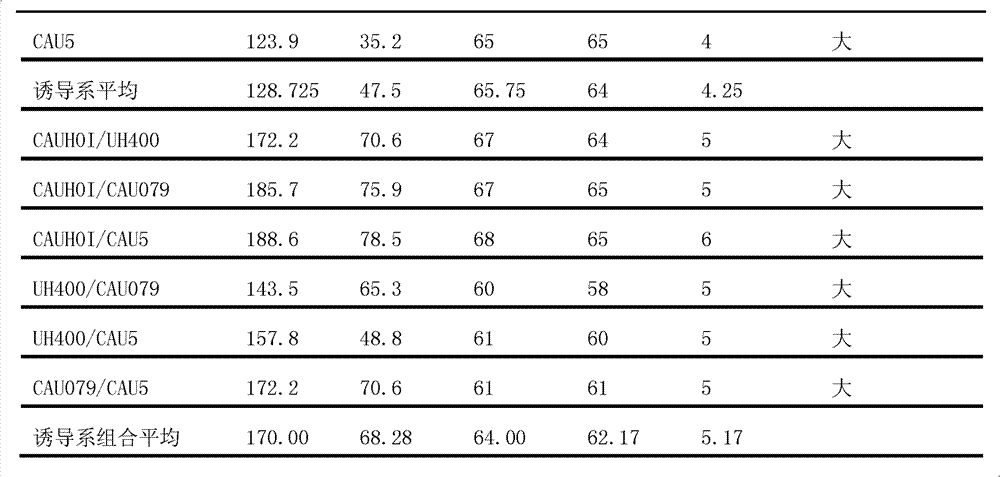Method for inducing corn haploid
A technology of haploid and haploid induction system, which is applied in the fields of botanical equipment and methods, application, plant gene improvement, etc., can solve the problems of unsatisfactory powder loosening and self-fertilization, unsatisfactory agronomic traits, etc. , to achieve good growth in the field, improve efficiency, and last for a long time
- Summary
- Abstract
- Description
- Claims
- Application Information
AI Technical Summary
Problems solved by technology
Method used
Image
Examples
Embodiment 1
[0035] Embodiment 1, the performance of agronomic traits of different induced lines selfing and hybrid combinations
[0036] CAUHOI, UH400 and two newly selected induced lines CAU5 and CAU079 were selected. In Hainan in 2009, the above four lines were crossed with each other, and the contemporary grains (namely F1 generation) were harvested. In the summer of 2010, various F1 materials were planted at Changping Experimental Station in Beijing, and the agronomic traits of the parents and F1 generations were compared. Agronomic traits include: plant height, ear position, powder loosening period, silking period, etc.
[0037] Plant height: plant height refers to the distance from the ground to the top of the tassel of the plant;
[0038] Ear position: Ear height refers to the distance from the ground to the base of the ear;
[0039] Days from sowing to silking: the silking period refers to the silking period when the filaments of the pistil of the plant protrude from the bracts ...
Embodiment example 2
[0047] Implementation case 2. Comparison of induction rate differences between hybrids of different induction lines and their parents
[0048] The test was carried out at the Beijing Changping Test Station in the summer of 2010. Take Zhengdan 958 as the test species (as the female parent) to hybridize with the parental induced line and the induced line hybrid in the above-mentioned Table 1 respectively, and each induced line or induced line hybrid is hybridized with at least 10 ears of the female parent material; then harvest the hybrid Contemporary grains, threshing, and haploid identification were performed to compare the induction rate differences between parental induced lines and induced line hybrids.
[0049] The method of haploid identification is as follows:
[0050] (1) Classify and thresh the hybrid ears of Zhengdan 958 according to different paternal sources for haploid identification;
[0051] (2) Observe the color of hybrid grain embryo and endosperm aleurone la...
Embodiment example 3
[0066] Implementation case 3. Induction effect of inducible hybrid UH400 / CAU5 and different female parent materials
[0067] In the winter of 2009, haploid induction was carried out at the Hainan Experimental Station with two inducible lines, UH400 and CAU5.
[0068] In the summer of 2010, UH400 / CAU5 was used as the male parent to cross with different female parents. Three commercial hybrids were initially selected as the female parent for hybridization, and the induction effect of the induced hybrids under different material backgrounds was compared.
[0069] Specific hybridization method: the male parent and the female parent are planted alternately, and the planting area is isolated from the surrounding area (at least 200 meters around without other corn planting), the female parent is emasculated before the male parent is scattered, and the male parent is detasseled by wind power. Pollen reaches the female parent, and pollination is achieved.
[0070] The different female...
PUM
 Login to View More
Login to View More Abstract
Description
Claims
Application Information
 Login to View More
Login to View More - R&D
- Intellectual Property
- Life Sciences
- Materials
- Tech Scout
- Unparalleled Data Quality
- Higher Quality Content
- 60% Fewer Hallucinations
Browse by: Latest US Patents, China's latest patents, Technical Efficacy Thesaurus, Application Domain, Technology Topic, Popular Technical Reports.
© 2025 PatSnap. All rights reserved.Legal|Privacy policy|Modern Slavery Act Transparency Statement|Sitemap|About US| Contact US: help@patsnap.com


